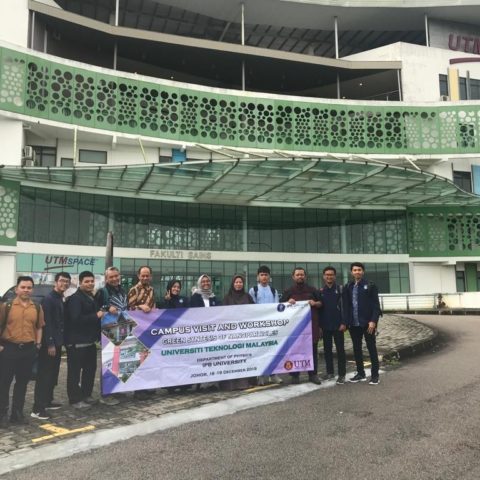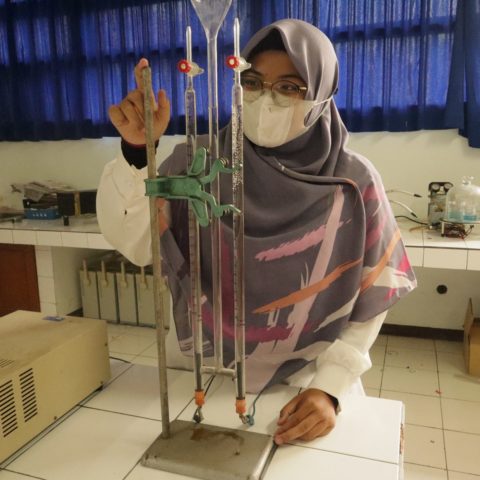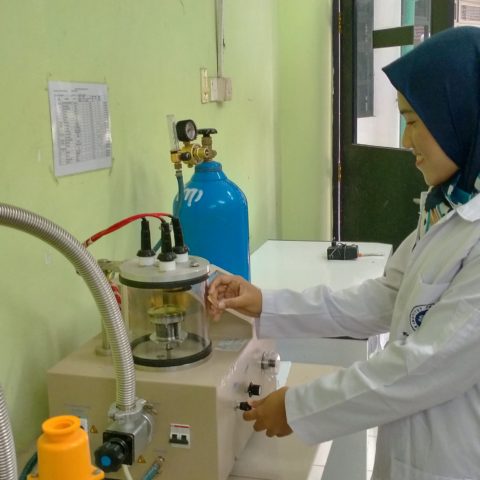Magister in Biophysics
Biophysics is a branch of knowledge that applies the principles of physics, mathematical analysis, and computer modeling to biological systems to understand the basic levels of the structure, dynamics, interactions, and functions of biological systems.
This interdisciplinary program plays a significant role in discovering the underlying mechanisms of biological systems, from molecular interactions to complex systems that exist in nature. In the last few decades, biophysics has also contributed to the development of biosciences research field such as biomedicine, biophotonics, bioelectronics, bioenergy, bioinstrumentation, etc.
Looking at its potential and urgency, the Department Physics, IPB University opened a Biophysics master study program in 2006 as a pioneer in developing and researching biophysics in Indonesia. Masters level competency is appropriate with the nature of biophysics, which is an interdisciplinary field requiring a deeper level of analysis than the undergraduate program. The existence of the Department of Physics in IPB provides a distinct advantage for biophysics research that comes from the availability of various research themes such as agriculture, fisheries, forestry, veterinary medicine, etc.
Since its establishment, the Biophysics master program has been actively contributing to the scientific community by publishing numerous research articles in local and international journals and patents. Administratively, the Biophysics study program has carried out management following higher education standards and received A accreditation since 2017 which is then converted to the title of Excellence (Unggul) in 2021. Graduates of the Masters in Biophysics program will receive a Master of Science (M.Sc.) degree.
Aims and Learning Outcomes
Biophysics master program, Department of Physics, FMIPA IPB aims to produce graduates who have the following competencies:
- Able to work professionally as a researcher, educator, or industrial practitioner in biophysics and other related fields.
- Able to solve problems related to biophysics systematically and scientifically.
- Able to manage research independently or in groups using an interdisciplinary approach to produce innovations in biophysics and other related fields.
The learning outcomes (LO) of the Biophysics master program are as follows:
- Able to analyze molecular biology systems using Physics concepts.
- Able to analyze the properties of advanced materials based on natural materials and other natured inspired materials
- Able to analyze complex biophysical systems.
- Able to apply computational and experimental physics methods.
- Able to design and conduct interdisciplinary research.
- Able to communicate effectively in both written and oral
- Able to work individually or in groups
- Meet the elements of attitudes and general skills according to SN-Dikti.
Participant
Participants in the Masters in Biophysics program are undergraduate graduates in the fields of mathematics and natural sciences, education in mathematics and natural sciences, engineering, agriculture, and other related sciences, from public and private universities, domestic or foreign with a recognized undergraduate diploma and matched by the Ministry of Research, Technology and Higher Education. The GPA requirement for a bachelor’s degree is > 2.75. All prospective students must have oral and written English skills and pass the entrance selection held by IPB.
Curriculum
The Biophysics Masters program, like other master programs, has a minimum graduation requirement of 36 credits. This program is pursued by 2 paths, namely the regular track and the track by research. The Physics Department of IPB also provides Past Learning Recognition (RPL) facilities for prospective students.
Regular Class
| Category | Course name | Credits |
| Common course (CC) | Biophysics Research Methodology | 3 |
| Statistics | 3 | |
| Orbital and Molecular Quantum Theory | 2 | |
| Thermal Biophysics | 2 | |
| Bioelectromagnetism | 2 | |
| Academic core course (ACC) | Membrane and Cell Biophysics | 2 |
| Biocompatible Material | 2 | |
| Biophysics and Complexity | 2 | |
| In-depth course (IC) | Characterization Methods in Biophysics | 2 |
| Biophysics Modelling | 2 | |
| Contemporary Biophysics | 2 | |
| Bioinspiration Material | 2 | |
| Bioelectronics and Biophotonics | 2 | |
| Surface Physics | 2 | |
| Environmental Biophysics | 2 | |
| Radiation Biophysics | 2 | |
| Protein Physics | 2 | |
| Sustainable Energy Physics | 2 | |
| Enrichment course (EC) | Graduate School Seminar | |
| Final Year Project | Colloquium | 1 |
| Research Proposal | 2 | |
| Seminar (EC) | 1 | |
| Thesis | 6 | |
| Publication | 2 | |
| Thesis Exam | 2 |
By research class
| Category | Course name | Credits |
| Common course (CC) | Biophysics Research Methodology | 3 |
| Fundamental course | Statistics | 3 |
| Academic core course (ACC) | Fundamental Biophysics | 1 |
| Biophysics Specialized Research Topic | 3 | |
| In-depth course (IC) | Biophysics Specialized Topic 1 | 2 |
| Biophysics Specialized Topic 2 | 2 | |
| Biophysics Specialized Topic 3 | 2 | |
| Biophysics Specialized Topic 4 | 2 | |
| Biophysics Specialized Topic 5 | 2 | |
| Enrichment course (EC) | Graduate School Seminar | |
| Final Year Project | Colloquium | 1 |
| Research Proposal | 2 | |
| Seminar (EC) | 1 | |
| Thesis | 6 | |
| Publication | 2 | |
| Thesis Exam | 2 |








